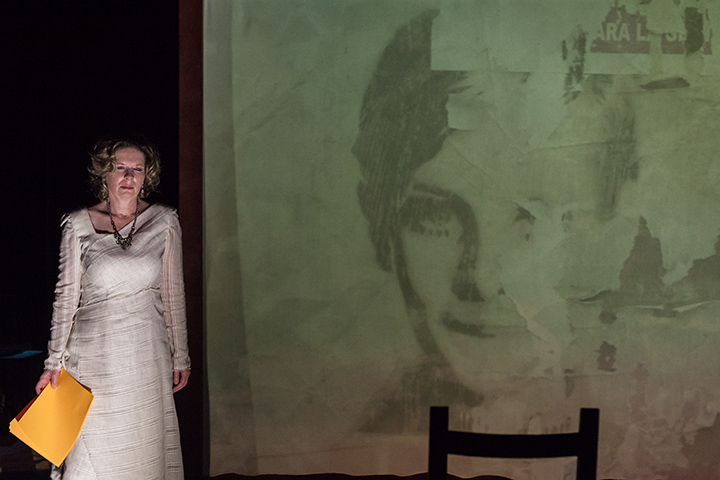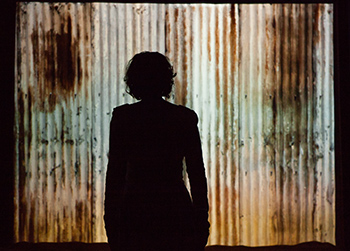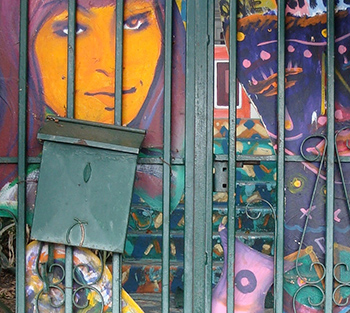Take 10 With a Triton: Roger Hailstork Returns to the Bookstore With a Focus on Accessibility
Profiles
By:
Published Date
By:
Share This:

Photo by Jim Carmody.
“Cuatro Corridos,” the new chamber opera by UC San Diego soprano Susan Narucki and Mexican author Jorge Volpi, earned rave reviews for its May 8 premiere on campus. But the opera, also performed May 10 and 11, represents only a portion of the project’s mission. The disturbing theme of young Mexican women forced into the sex trade was also the subject of two May 9 panels. One featured the opera’s creators. The other included experts who described their efforts to identify and arrest sex trade perpetrators and to help their victims.
While much new and experimental music is built around explorations of form, instrumentation and new technologies, Narucki said that “the music of our time is not speaking to social issues.” By contrast, “Cuatro Corridos” combines provocative music with Volpi’s libretto to express the human cost of the border sex trade.
In four acts, Narucki portrays four women caught up in human trafficking. Among them are Azucena, who is captured and forced into prostitution, and Rose, a San Diego police officer who wonders what will happen to sex slaves who are freed but whose options are limited.
Music comes from two Mexican composers – Hilda Paredes and Hebert Vázquez – as well as UC San Diego’s Lei Liang, who was born in China; and Arlene Sierra, who was born in the United States but now lives in London.
The music by each composer is distinctive, but all of them combine jarring instrumental and vocal sounds with Volpi’s prose. During the premiere, percussionist Steven Schick dragged a violin bow across the bars of a marimba; guitarist Pablo Gomez scratched his strings with his pick; and pianist Aleck Karis reached under the piano’s to strum the strings. Narucki’s vocals sometimes became moans, cries and other visceral utterances.

Photo by Jim Carmody.
The three musicians helping Narucki enact the musical drama are all affiliates of the UC San Diego department of music: Schick and Karis are faculty; and Gomez, a graduate student in performance.
The production was stark, evoking the bleak content. Narucki wore a simple white dress throughout the one-hour performance, which was presented without intermission. A large screen displayed images such as a steel fence, a poor Mexican village and nightmarish abstract forms.
A note about terminology: While the victims are often referred to as prostitutes, in fact the majority are not paid for their work. Instead, they are detained by their captors through starvation, rape, physical abuse, psychological torture, and locked doors. Various fines imposed on the women for disobeying can only be paid off through continued sex work.
At the Tuesday morning panel, Volpi noted that Mexican women have served as sex slaves since the Aztec era. He was drawn to the idea of creating four characters based on real-life stories.
Paredes said that in Mexican cities such as Ciudad Juárez, young girls are forced – sometimes by their families – to become prostitutes. She said she hopes her music “gives voice to women who have been abused.”
On Tuesday afternoon, professionals who work to reveal the extent of the billion-dollar sex trade and to help its victims provided real-world examples of the abuses explored in the opera.
Coleen Lassegard of Caring Residents of Carlsbad/La Posada Homeless Shelter noted that the sex trade is active even in upscale San Diego locales. In Carlsbad, she has seen girls in high heels near the flower fields. They provide sex to day laborers, guarded by thugs with automatic rifles who make sure that the girls do not escape.
Daliah Setareh, senior attorney at the Legal Aid Foundation of Los Angeles, said that gangs are involved in the prostituting of young Mexican women. Gang slang “PHD” stands for “pimping hos daily.”
In 2010 in Los Angeles, several members of a family running a major prostitution ring were identified and prosecuted. A cab driver had alerted authorities. He often carried young Mexican women and suspected that some had been coerced into the sex trade. Some defendants received prison sentences of 35 years or more.

Marketing art for Cuatro Corridos. Photo by Dirk Sutro.
Meanwhile, the “Cuatro Corridos” project’s combination of innovative chamber opera and thought-provoking public forums made a powerful statement. Large audiences were drawn to the performances, and the opera earned rave reviews.
Los Angeles Times music critic Mark Swed described the opera as “an intensely disturbing operatic investigation into sex trafficking,” and praised Narucki’s performance as “commandingly theatrical.” U-T San Diego’s James Chute, meanwhile, noted that Narucki sang with “absolute conviction and commitment.”
Narucki, wrote Chute, believes “that music has the power to not just entertain, but to engage, to enlighten, to even change the world.” And her performance, he said, made him a believer too.
Given the project’s artistic and sociopolitical vitality, Narucki and Volpi hinted that the premiere of “Cuatro Corridos” might be just the beginning.
“Cuatro Corridos”has received generous support from UC MEXUS, the MAP Fund for the Performing Arts (Doris Duke Charitable Foundation), Yellow Barn Music Festival and UC San Diego’s Department of Music
For more information visit: http://cuatrocorridos.com
Share This:
Keep up with all the latest from UC San Diego. Subscribe to the newsletter today.